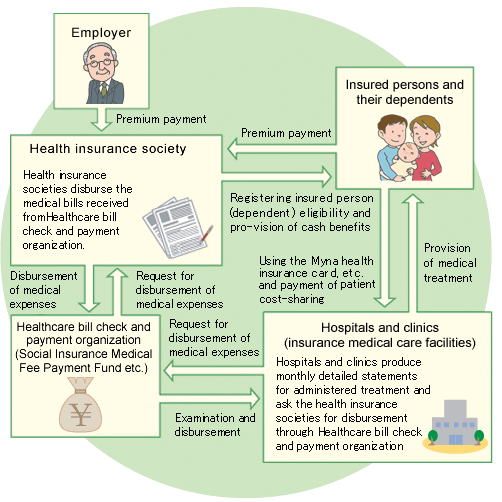Insurance benefits
Health insurance pays various prescribed insurance benefits in the event of nonoccupational sickness or injury, childbirth, and death. The term “insurance benefits” refers to the provision of medical care services and payment for these services.
- Tips
-
- Insurance benefits are benefits from health insurance paid in cases of nonoccupational sickness or injury.
- Benefits are available only for treatment authorized in advance by the national government as eligible for insurance coverage.
Benefits paid for nonoccupational sickness and injury
If you suffer from a nonoccupational sickness or injury, you can undergo treatment, including the following, at a hospital or clinic providing medical care covered by health insurance:
- Medical consultation
- Provision of medicines or therapeutic materials
- Treatment, surgery, or other medical care
- Medical care or nursing care at home
- Hospitalization or nursing care
Use Worker's Accident Compensation Insurance for injuries sustained at work or while commuting
Health insurance provides benefits for nonoccupational sickness or injury. Worker's Accident Compensation Insurance covers injuries sustained at work or while commuting. Note that you cannot receive benefits from both types of insurance for the same injury.
- *When even illnesses and injuries on-the-job are not targeted for benefits of the Worker's Accident Compensation Insurance, benefits of the health insurance are provided except the duties as the officer of the corporation (except for a corporation less than five employees).
Benefits-in-kind and cash benefits
Insurance benefits are provided in two ways: provision of the medical care itself to treat a sickness or injury and provision of money to cover the cost of medical care. “Benefits-in-kind” refer to the provision of medical care; “cash benefits” refer to the provision of cash to cover medical care costs.
In some cases you cannot use health insurance
Health insurance benefits are available only for treatment authorized in advance by the national government as eligible for insurance coverage as safe and effective treatment methods.
| When you cannot use health insurance | When you can use health insurance |
|---|---|
| Freckles, birthmarks, pimples, moles, body odor, and the like that do not obstruct job execution or interfere with everyday life | If you have symptoms that require treatment |
| Nearsightedness, farsightedness, astigmatism and strabismus with no chance of recovery | For medical consultations, checkups, and lens prescriptions by an insurance doctor for a vision abnormality |
| Cosmetic surgery | For cosmetic surgery to treat an injury |
| Health examinations, screenings for lifestyle related diseases, complete check-ups | For treatment deemed necessary following a medical consultation |
| Immunizations and preventive internal medicines | For immunizations against tetanus when the possibility of infection is present |
| Normal pregnancy and delivery | When treatment is needed for pregnancy-induced hypertension, abnormal delivery, or other related conditions. For treatment of infertility (Limitations apply depending on the age and nature of treatment.) |
| Voluntary abortions for economic reasons | For abortion pursuant to the Mother's Body Protection Law for reasons other than economic reasons |
In some cases, insurance benefits are provided subject to certain restrictions
Insurance benefits are restricted in the following cases, even for nonoccupational sickness or injury:
| All benefits restricted (not including funeral expenses) |
|
|---|---|
| All or some benefits restricted |
|
| Some benefits restricted |
|
- ** Insurance benefits also are not provided to individuals in Juvenile Training Schools, penal institutions, detention facilities, or similar facilities for various reasons, including the availability of alternate medical care benefits at public expenditure.
System for payment of medical care costs
Medical care institutions bill the Health Insurance Society for its share of the costs of sickness and injury treatment received by members combined on a monthly basis. However, since individual billing and payment by all medical care institutions to all health insurance societies in Japan would be extremely complex, billing and payment are conducted through healthcare bill check and payment organizations (such as the Health Insurance Claims Review & Reimbursement Services).
Accordingly, billing and payment of medical care costs is carried out through healthcare bill check and payment organizations such as the Health Insurance Claims Review & Reimbursement Services (HICRRS). The Health Insurance Society is billed for medical care costs about two months later. Other payments, such as payment of benefits from health insurance to individual members, also takes place at least three months after the month of the medical care.






